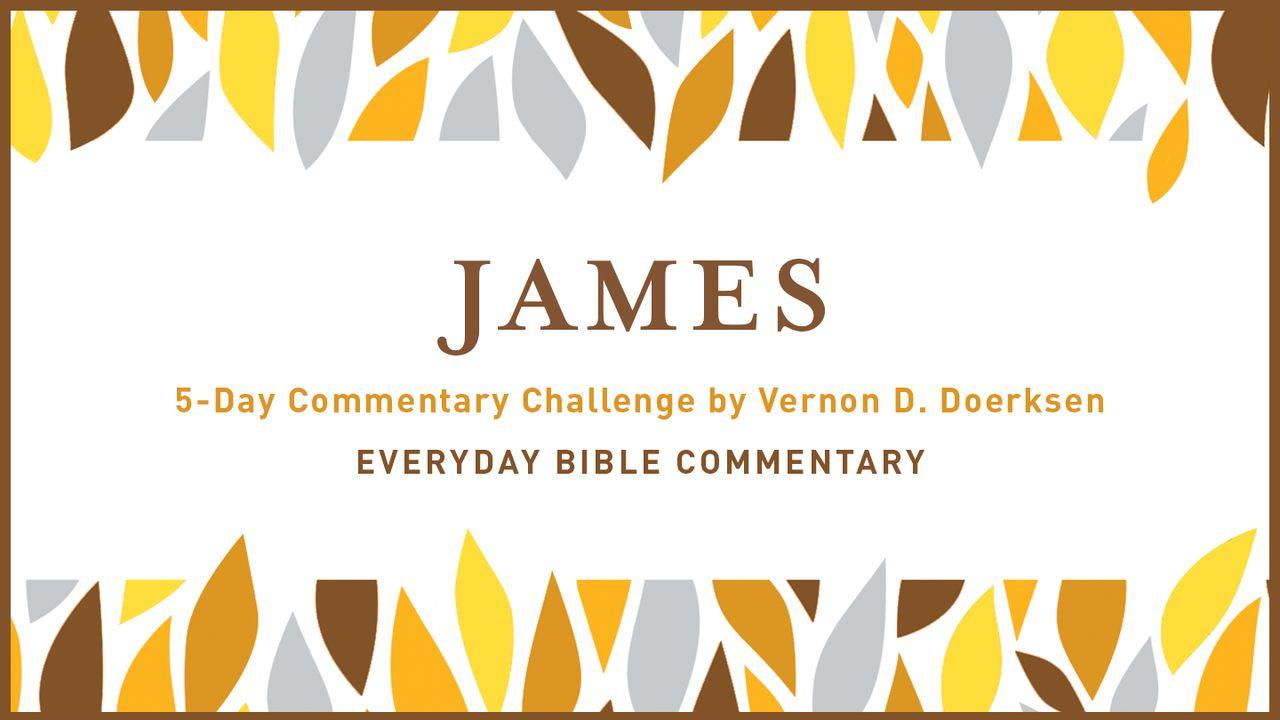5-Day Commentary Challenge - James 4Sample

THE INAPPROPRIATENESS OF PRESUMPTUOUS JUDGING, 4:11–12
The connection between these verses and the preceding is obvious. When true humility is lacking, malicious backbiting will often occur. The imperatives of verse 7–10 are Godward; the emphasis now is manward. James again returns to the topic of human speech (cf. 1:26; 2:12; 3:1–12). The command “Do not speak against” is present tense, indicating that censorious speech was habitual among the readers. It needed to be terminated. “To speak against” (lit., “to speak down on”) carries the idea of running someone down, to lower a person in someone else’s estimation. Often the motive is to exalt oneself by maliciously slandering another. Peter writes on non-Christians speaking down against Christians (1 Peter 2:12; 3:16). That is to be expected; but for a Christian to do it to a fellow believer is inappropriate, irresponsible, and a usurpation of God’s prerogative to judge. The reciprocal pronoun “one another” suggests that the situation was not one- sided, but those being maligned were themselves slandering in return. There was a failure to turn the other cheek. What makes that so grave is that they were “brethren.” Members within the family of God were running each other down. Brothers and sisters “for whom Christ died” (Rom. 14:15) were being hurt. The law of love was being violated. Small wonder that there were quarrels and conflicts going on in the body!
Having given the injunction against abusive speech, James proceeds to explain why such verbal disparagement of a fellow Christian is so inappropriate. Such a person sets himself up as a judge of the law (v. 11), arrogantly usurping God’s prerogative to be the Lawgiver and Judge (v. 12). The one who speaks against a brother is, in effect, passing judgment on his peer. The command of the Lord is “Do not judge, and you will not be judged; and do not condemn, and you will not be condemned; pardon, and you will be pardoned” (Luke 6:37; cf. Matt. 7:1). Paul counseled, “Let us not judge one another anymore” (Rom. 14:13). To disparage a brother, then, is placed by James on the level of unauthorized judging and malicious discrediting of a brother. So serious and unfamilylike is the matter that James used “brother” or “brethren” three times in this one verse.
To be a judge over a brother’s conduct is to usurp the privileges of deity and pass judgment on divine law. “Law” should not be thought of as the Mosaic law with all its ordinances, but rather the heart of God’s moral law—perfect love to God and one’s neighbor (Lev. 19:18; Deut. 6:5; Mark 12:30–31; Gal. 5:14). Here the emphasis is on the second part—love to one’s neighbor—already identified as the “perfect law, the law of liberty” (1:25) and the “royal law” (2:8). To backbite and run one another down is to violate the divine law of love. In doing that one is, in effect, implying that the law is not right and should be annulled. In the original Old Testament context of the command to love one’s neighbor (Lev. 19:15–18), several related commands are mentioned: “You are to judge your neighbor fairly” (v. 15); “You shall not go about as a slanderer among your people” (v. 16); “You shall not hate your fellow countryman in your heart” (v. 17); and “You shall not take vengeance, nor bear any grudge against the sons of your people” (v. 18). Thus grudging, slandering, backbiting, and unfairness all violate the law of love. And to violate a law is tantamount to judging the law and putting oneself above it. As James writes, “You are not a doer of the law, but a judge of it.” By disregarding the law, one is implying that he is qualified to abrogate it and enact a different or better law. God wants believers to be doers, not merely hearers (1:23; cf. Rom. 2:13), or worse yet, judges of the law.
It is not fitting for a brother to become a judge, for “there is only one Lawgiver and Judge” (v. 12). “One” can be understood either as the subject of the verb “is” (“one [only] is the Law- giver and Judge”), or as the predicate nominative (“there is [only] one Lawgiver and Judge”). The former rendering emphasizes the uniqueness of the one who is the Lawgiver and Judge; the second emphasizes the truth of monotheism. God gave the law; He, who is the only God, is the only one above the law. To seek to change or abrogate the law is to seek to take the place of God.
God, not man, “is able to save and to destroy.” That twofold capacity affirming God’s sovereignty is a truth often expressed in Scripture: “It is I who put to death and give life” (Deut. 32:39; cf. 2 Kings 5:7). “Is able” emphasizes that God is fully able to carry out His purposes. Often in Scripture the believer is comforted, knowing that God is able (Matt. 3:9; Rom. 14:4; Eph. 3:20). “Save” and “destroy” may have present application, but the eschatological meaning seems to be primarily in view. It is then that God will give His verdict as the sovereign judge.
James concludes his argument concerning inappropriate judging with the penetrating question “But who are you who judge your neighbor?” It is as if he is saying, “Who are you to take God’s place?” In the original, “you” is in the position of emphasis. It makes the question personal and piercing: “You, who are you who judge your neighbor?” “Neighbor” replaces “brother,” indicating clearly that the subject is the “royal law” of loving one’s neighbor (2:8).
Scripture
About this Plan

This reading plan is from the Everyday Bible Commentary on James 4 and will help you dig deeper into Scripture. It is for anyone who has a desire to grow in their understanding of the Word and strengthen your relationship with God by being "quick to listen, slow to speak, and slow to become angry."
More
We would like to thank Moody Publishers for providing this plan. For more information, please visit: https://www.moodypublishers.com/books/bible-study-and-reference/james--everymans-bible-commentary/
Related Plans

Finding Your Way Back to God

Keeping Godly Relationships

2 Samuel 1-11:1: A King After God's Own Heart

I'm New! What Do I Do?

Team C4C Testimonies

Becoming Love: If We Start at Finish, Where Do We End? (Part 3)

Admonishment: Love’s Hard Conversation

Foundation First: Building Habits That Actually Last

Wake Up Your Faith
